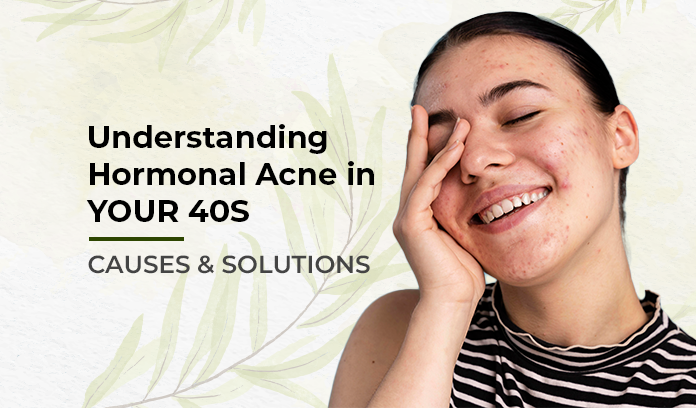As we age, our bodies undergo several changes, and one aspect that can be surprising to most is the onset of hormonal acne in the 40s. Often associated with adolescence, acne can resurface during midlife due to hormonal changes.
Understanding the underlying causes and seeking effective solutions are vital to managing this skin condition in your 40s.
Cause of hormonal acne in your 40s
Hormonal fluctuations in your 40s are primarily caused by perimenopause – a transitioning phase leading to menopause. As ovaries start producing fewer hormones, including estrogen and progesterone, it leads to a hormonal imbalance.
The increase in androgens(male hormones) can overstimulate the sebaceous glands, clogging the pores and causing acne breakouts.
Another contributing factor is stress. Balancing work and personal life struggles can lead to increased stress levels.
Stress can lead to an increase in Cortisol levels, a hormone that can influence androgen production and exacerbate your acne.
How to treat Hormonal Acne
- Skincare routine:
Start with a gentle non-comedogenic cleanser that doesn’t strip your skin of its natural oils. Look for anti-acne ingredients like salicylic acid or benzoyl peroxide that target acne-causing bacteria or a retinoid cream/gel that helps boost cell turnover and reduce acne scarring.
- Hormone therapy:
Hormone therapy can help balance out your estrogen and progesterone levels, reducing acne flare-ups.
If your hormonal changes are causing severe acne, try consulting a dermatologist about hormone replacement therapy/treatments.
- Dietary changes:
Adopt a balanced, nutritious diet that boosts overall skin health and has a positive impact on your acne concerns.
Vitamins A, C, E, and omega-3 fatty acids are loaded with antioxidants beneficial for your skin. Avoid sugary, refined, and processed foods that can trigger inflammation and lead to frequent breakouts.
- Manage stress levels
Stress-reducing activities like yoga and meditation help lower cortisol levels and improve optimal well-being. This results in healthier and clearer skin.
- Topical treatments:
Over-the-counter gels and creams help reduce inflammation and redness with the help of anti-inflammatory ingredients.
To prevent future acne breakouts, they also regulate sebum production levels.
- Consult a dermatologist:
If your hormonal acne persists or worsens over time, it would be best to seek a dermatologist who can offer personalized advice best suited to your skin type.
This could range anywhere from oral antibiotics to laser therapy or chemical peels.
Conclusion
By addressing hormonal imbalances, working on a better work/life balance, practicing stress reduction techniques, and using appropriate skincare products, your 40s can be a time to regain control over your skin.
Hormonal acne in the 40s may be unexpected or difficult to deal with, but it is possible to achieve a healthier complexion with the right methods and outlook.











